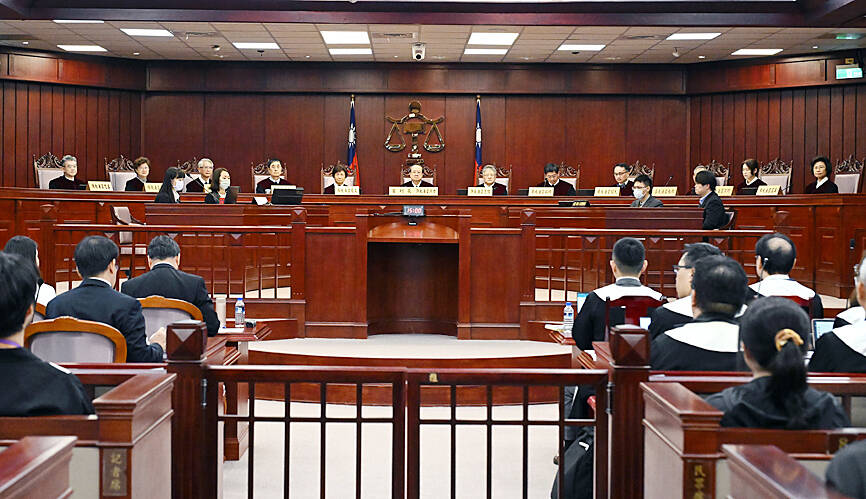The Constitutional Court yesterday ordered the temporary suspension of controversial legislative reform bills passed in May in a move that prevents the legal changes from being implemented.
The suspension is to remain in force until the court rules on the constitutional challenges to the bills, affecting one article of the Criminal Code and eight articles of the Act Governing the Legislative Yuan’s Power (立法院職權行使法), the court said in a news release.
The ruling means the legal amendments promulgated on June 24 cease to be in effect for the time being.

Photo: Liao Cheng-hui, Taipei Times
The legislature is to function according to the original laws before the amendments were passed, the court said.
The legislative reform bills, which passed through the joint efforts of the opposition Chinese Nationalist Party (KMT) and Taiwan People’s Party legislators, would empower lawmakers to compel officials and private citizens to testify in investigative hearings.
The changes would authorize the Legislative Yuan to impose fines on individuals who refuse to comply with summons while criminalizing non-compliance by officials with penalties including imprisonment.
The Presidential Office, the Executive Yuan, the Control Yuan and the Democratic Progressive Party (DPP) caucus separately filed for constitutional interprerations with the court.
The Constitutional Court held a preliminary meeting in a three-hour session on Wednesday last week attended by attorneys and representatives of the four petitioning agencies and the respondents representing the Legislative Yuan.
The justices found sufficient cause to suspend the amendment to Article 15 of the act authorizing the Legislative Yuan to stipulate demands on the president’s conduct during a state of the nation address before the legislature, the court said.
The legislature’s assertion of this power is problematic as it represents an act of self-empowerment that shifts the boundaries between the branches of government, it said.
The implementation of this amendment would result in a constitutional crisis and trigger an escalation of political conflict with the potential to inflict significant harm on the public good, it said.
The temporary suspension of the amendment would allow the president and the legislature to conduct these reports as before, ensuring the business of government can proceed unobstructed, the court said.
The Chinese Nationalist Party (KMT) caucus in a news release said that the Constitutional Court’s ruling “only proves that judicial independence has died.”
“As the largest party in the legislature, the KMT has the responsibility to challenge a constitutional court that lacks autonomy and soulless justices to defend the spirit of the rule of law in the Republic of China,” it said.
The party remains committed to participating in the constitutional litigation in an effort to “defend the last hope for freedom and democracy,” the caucus said.
The court’s speedy decision to suspend the legislative reform bills and dismissal of the KMT’s motion for recusals are proof of the DPP’s control over the justices, it added.
DPP caucus secretary-general Rosalia Wu (吳思瑤) urged the opposition to refrain from slandering the justices.
The DPP caucus respects the Constitutional Court’s ruling and is doing its best to prepare for the legal arguments on Aug. 6, she said.

INVESTIGATION: The case is the latest instance of a DPP figure being implicated in an espionage network accused of allegedly leaking information to Chinese intelligence Democratic Progressive Party (DPP) member Ho Jen-chieh (何仁傑) was detained and held incommunicado yesterday on suspicion of spying for China during his tenure as assistant to then-minister of foreign affairs Joseph Wu (吳釗燮). The Taipei District Prosecutors’ Office said Ho was implicated during its investigation into alleged spying activities by former Presidential Office consultant Wu Shang-yu (吳尚雨). Prosecutors said there is reason to believe Ho breached the National Security Act (國家安全法) by leaking classified Ministry of Foreign Affairs information to Chinese intelligence. Following interrogation, prosecutors petitioned the Taipei District Court to detain Ho, citing concerns over potential collusion or tampering of evidence. The

‘FORM OF PROTEST’: The German Institute Taipei said it was ‘shocked’ to see Nazi symbolism used in connection with political aims as it condemned the incident Sung Chien-liang (宋建樑), who led efforts to recall Democratic Progressive Party (DPP) Legislator Lee Kun-cheng (李坤城), was released on bail of NT$80,000 yesterday amid an outcry over a Nazi armband he wore to questioning the night before. Sung arrived at the New Taipei City District Prosecutors’ Office for questioning in a recall petition forgery case on Tuesday night wearing a red armband bearing a swastika, carrying a copy of Adolf Hitler’s Mein Kampf and giving a Nazi salute. Sung left the building at 1:15am without the armband and apparently covering the book with a coat. This is a serious international scandal and Chinese

Seventy percent of middle and elementary schools now conduct English classes entirely in English, the Ministry of Education said, as it encourages schools nationwide to adopt this practice Minister of Education (MOE) Cheng Ying-yao (鄭英耀) is scheduled to present a report on the government’s bilingual education policy to the Legislative Yuan’s Education and Culture Committee today. The report would outline strategies aimed at expanding access to education, reducing regional disparities and improving talent cultivation. Implementation of bilingual education policies has varied across local governments, occasionally drawing public criticism. For example, some schools have required teachers of non-English subjects to pass English proficiency

TRADE: The premier pledged safeguards on ‘Made in Taiwan’ labeling, anti-dumping measures and stricter export controls to strengthen its position in trade talks Products labeled “made in Taiwan” must be genuinely made in Taiwan, Premier Cho Jung-tai (卓榮泰) said yesterday, vowing to enforce strict safeguards against “origin laundering” and initiate anti-dumping investigations to prevent China dumping its products in Taiwan. Cho made the remarks in a discussion session with representatives from industries in Kaohsiung. In response to the US government’s recent announcement of “reciprocal” tariffs on its trading partners, President William Lai (賴清德) and Cho last week began a series of consultations with industry leaders nationwide to gather feedback and address concerns. Taiwanese and US officials held a videoconference on Friday evening to discuss the